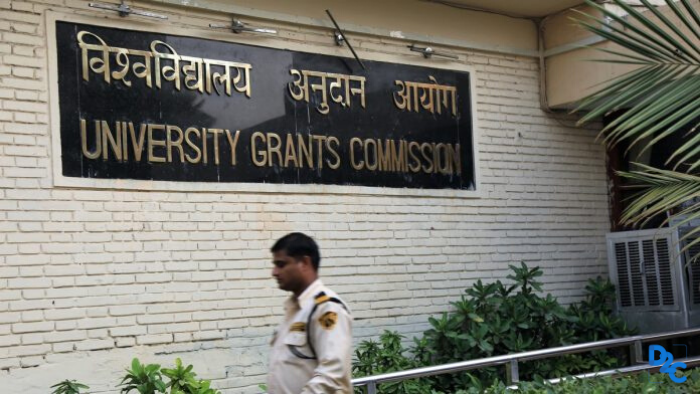Unstop Weekend Internship
All colleges to open from 1st August: UGC issues guidelines for Academic Calendar 2020-21

In light of the recent Coronavirus outbreak, new guidelines for examinations and the academic calendar were issued by the University Grants Commission on Wednesday. For the current academic session, the guidelines disclosed the dates for conducting the intermediate and terminal examination of students which will now be held between the months of July and August 2020.
The universities have also been advised to adopt simplified and alternative modes for completing the examination process, like reducing the time duration to a period of 2 hours from 3 hours and offering the flexibility of both, offline and online examinations. These UGC issued guidelines for the academic calendar, based on two expert committee recommendations, are suggestive in nature and can be adjusted and modified by universities as per their requirements and the state of affairs.
Introduce Virtual Classrooms
Additionally, the guidelines declared that the universities may choose to adopt the six-day week pattern, ensuring the facilities of video conferencing and develop virtual classrooms. All teaching staff is required to be trained with the use of technology to prepare e-content including e-lab experiments so that they can upload them on their website. The faculty should also be adequately trained to use ICT and other online tools for teaching such that they complete around 25% of their syllabus via online teaching.
Keeping the current scenario in perspective, two academic calendars were suggested by the UGC - one for the year 2019-20 (the remaining session that got disrupted due to the outbreak of COVID-19) and the other for the new academic year of 2020-21. The functioning of the old year would continue via online means of teaching/ distance learning modes (emails, social media, video conferencing, etc.) till May 31st 2020. Activities that include the finalisation of project/ internship reports, dissertation, e-labs, assignment, placement drive, internal assessment will be conducted between 1s June and 15th June 2020. Terminal and intermediate examinations will be conducted between 1st July and 31st July 2020 with results being declared on 31st July for terminal and 15th August for intermediate.
Evaluation on grounds of Internal Assessment
The UGC also said that if in case the situation fails to return back to normal, the universities will be required to maintain social distancing norms and grade students on the basis of internal assessments and the marks they scored in the previous semester. That means, under crucial circumstances, students will be awarded 50% marks on the basis of the pattern of internal evaluation adopted by the universities and the remaining 50% will be awarded on the basis of their performance in the previous semester (if available).
The internal evaluation can be in the form of prelims, continuous evaluation, mid-semester, or anything else that can be used for evaluating the progress of students. If in case the previous year performance of students is unavailable, 100% of their evaluation will be done on the basis of their internal assessment. In such a scenario, students might also be allowed to sit for special exams in the next semester to improve their grades.
Academic Calendar for the session 2020-21
The academic calendar issued by the UGC is suggestive. The universities may adopt this after assessing the state of the pandemic in their region, their level of preparedness, the residential facilities for students along with other factors.
| S.No. | Event | Dates |
| 1. | Commencement of Classes (Students of 2nd/3rd year) | 01.08.2020 |
| 2.. | Admission Process | 01.08.2020 to 31.08.2020 |
| 3. | Commencement of Classes for fresh batch (First Semester/ Year) | 01.09.2020 |
| 4. | Conduct of Examinations | 01.01.2021 to 25.01.2021 |
| 5. | Commencement of Classes for Even Semester | 27.01.2021 |
| 6. | Dispersal of Classes | 25.05.2021 |
| 7. | Conduct of Examinations | 26.05.2021 to 25.06.2021 |
| 8. | Summer Vacations | 01.07.2021 to 30.07.2021 |
| 9. | Commencement of the next Academic Session | 02.08.2021 |
Other important guidelines issued by the UGC
- Universities are allowed to follow a six-day week schedule.
- Students must be given exposure to practical experiments and laboratory assignments through virtual laboratories. Digital resources along with recorded visuals of laboratory work must be shared for this purpose.
- The link for virtual laboratories provided by MHRD to facilitate the students of engineering/ science/ technology may also be used for this purpose.
- Development of virtual classrooms and facilities for video conferencing. All teaching staff must be equipped with the use of technology.
- Universities must prepare e-content/ e-lab experiments and upload the same on their respective websites.
- The mechanism of mentor-mentee counselling must be strengthened.
- Universities are also advised to maintain a proforma to record the stay/ travel history for the students and staff members for the period of lockdown, when they were away from the university.
- The faculty must be trained adequately to use ICT and online teaching tools to ensure that they complete at least 25% of their syllabus via online teaching and the remaining 75% through offline or face to face teaching.
Login to continue reading
And access exclusive content, personalized recommendations, and career-boosting opportunities.
Don't have an account? Sign up














Comments
Add comment